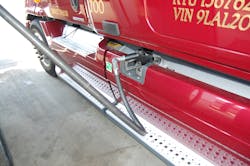Fuel prices decline, while DEF’s stay stable
Retail diesel and gasoline prices stayed on the downswing for the fourth week – though they remain well above the price marks set during the same period in 2012 – while prices for diesel exhaust fluid (DEF) remained relatively flat between May and June this year.
According to the Energy Information Administration (EIA), U.S. average retail pump prices for diesel declined 2.1 cents to $3.817 per gallon this week; however, that’s 16.9 cents per gallon higher compared to the same week in 2012, the agency said.
Diesel prices dropped in all regions of the country, with the Lower Atlantic ($3.731 per gallon) and Gulf Coast ($3.734) sporting the lowest cost. The biggest one-week decrease in diesel occurred in the Midwest, where prices dropped 3.2 cents this week to $3.815 per gallon.
U.S. average retail pump prices for gasoline dropped 8.1 cents to $3.496 per gallon this week and are down nearly 16 cents per gallon since the week of June 11, according to EIA’s data. That being said, gasoline prices remain 14 cents per gallon higher this week compared to the same time period in 2012, the agency noted.
The Gulf Coast ($3.312 per gallon), Lower Atlantic ($3.39) and Midwest ($3.394) were home to the cheapest gasoline prices in the country this week, with the Midwest also experiencing the largest one-week drop in prices: some 15.2 cents per gallon.
By contrast, prices for DEF – a solution comprised of 67.5% water and 32.5% automotive grade urea, that is a key element in the selective catalytic reduction (SCR) emission control process now used on almost all diesel-powered trucks in the U.S. – remained flat, according to data tracked by Integer Research.
DEF prices stayed steady at $2.79 per gallon in the U.S. – a price point held since November 2012 – and at 80 Canadian cents per gallon in Canada, which equates to $3.01 per gallon in the U.S.; a price position held since October 2011, the firm said.
However, tote and bulk deliver prices charted two very different price courses between May and June this year, Integer noted, with tote refill prices per gallon showing a one cent decrease in the U.S. over those two months while the U.S. national average for LTL bulk deliveries increased by six cents per gallon during that same time period.
Yet Monica Baker, Integer’s research manager, told Fleet Owner that urea prices weakened significantly in the spring this year as a result of wet and adverse weather conditions in the Midwest, which delayed planting and a strong urea import lineup into the U.S. Gulf. As a result she expects some weakening of DEF prices to start occurring.
“Totes are first to feel the impact of cost volatility as they are the most liquid market, so you would expect to see a delayed reaction in other delivery modes,” Baker added.
Integer’s data also indicated that Tampa, FL, and Toronto, Ontario, posted the highest average prices for 2.5 gallon jugs in the U.S. and Canada, respectively. The firm also said just under 50 new truck stop locations in the U.S. added DEF pump service in June, approximately half of them by the Pilot truck stop chain.
About the Author
Sean Kilcarr
Editor in Chief
Sean Kilcarr is a former longtime FleetOwner senior editor who wrote for the publication from 2000 to 2018. He served as editor-in-chief from 2017 to 2018.
